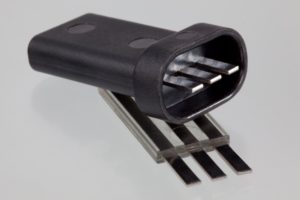Assembly Injection Moulding

| Assembly Molded Plastic-Metal Hybrid Specimen – Connector |
In assembly-injection-molding processes, two or more parts made of plastic or of other materials are joined by master shaping at least one component to a part or a complex system. This includes both multi-component injection molding and injection molding with inserts. The latter may be compact or flat, stiff or flexible or already very complex like electronic circuit boards. The connection can be established by form fitting, force closure or adhesion bonding.
Due to its numerous advantages such as the possibility for functional integration or its high cost-efficiency, assembly-injection-molding is used in many applications with different objectives such as lightweight design or in complex machine elements. A particular focus of the institute is also assembly molding for mechatronic applications as in the medium-tight encapsulation of electrical components.
Within the research activities of the LKT material, processing and geometric factors with regard to the adhesion between different components are examined as with plasma treatments or coating. In addition, the thermal, mechanical and thermo-mechanical stress on the systems during processing and application performance plays a central role. In this context, the use of computer-aided methods is indispensable.
Through the institute’s years of experience on this subject, a wide range of specimens tools have emerged, ranging from simple, geometric, multi-component plates and tension bars to more complex specimens such as a multi-component gear or the Erlangen-carrier. Although facilities for Open-Air ® plasma pretreatment are available, in the area of testing there are also specialized facilities, for example for media tightness in addition to conventional test equipment, for evaluating the bond strength.
Dr.-Ing. Uta Rösel
Institute of Polymer Technology
Processing (Head of Department)
- Phone number: +49913185-71002
- Email: uta.ur.roesel@fau.de
